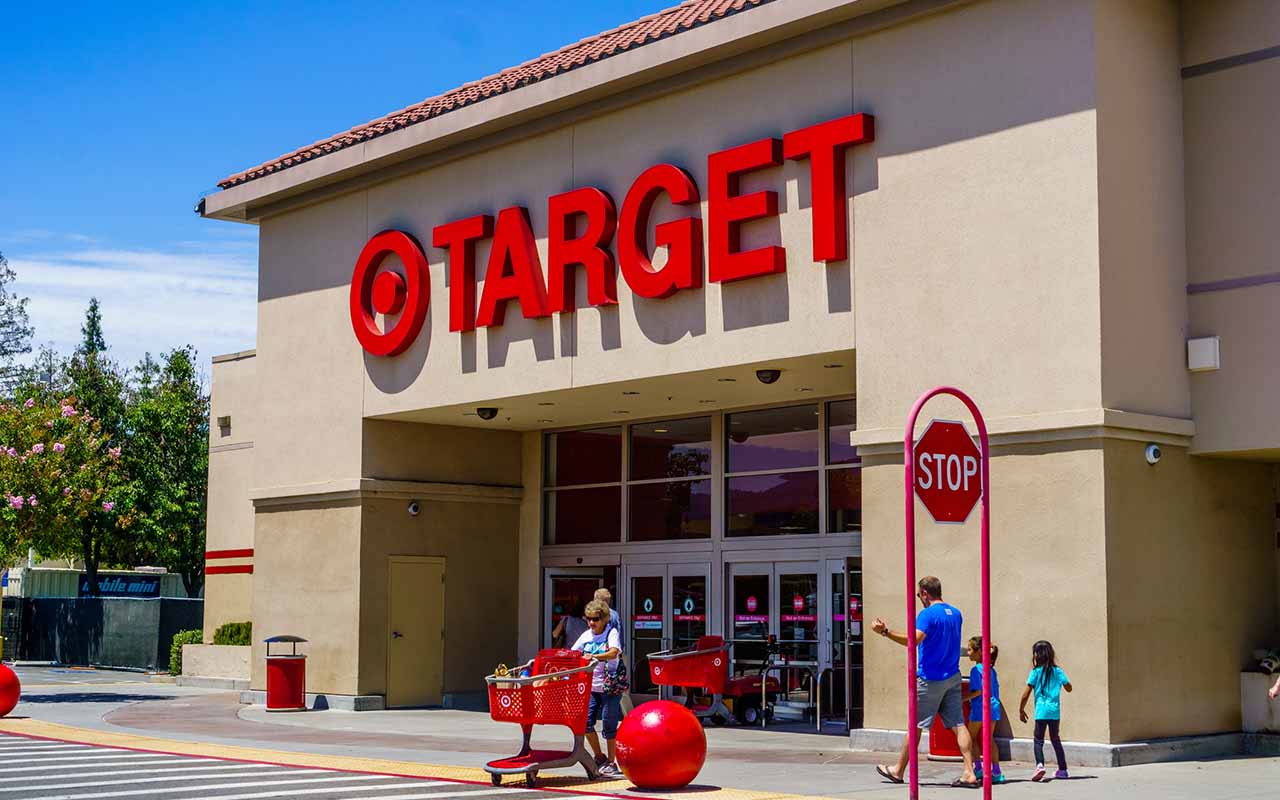Target to Stop Accepting Personal Checks, But Is the Checkbook Era Really Over?
Target won’t accept personal checks from July 15, following Aldi and Whole Foods Market in ditching the payment method.


Profit and prosper with the best of Kiplinger's advice on investing, taxes, retirement, personal finance and much more. Delivered daily. Enter your email in the box and click Sign Me Up.
You are now subscribed
Your newsletter sign-up was successful
Want to add more newsletters?

Delivered daily
Kiplinger Today
Profit and prosper with the best of Kiplinger's advice on investing, taxes, retirement, personal finance and much more delivered daily. Smart money moves start here.

Sent five days a week
Kiplinger A Step Ahead
Get practical help to make better financial decisions in your everyday life, from spending to savings on top deals.

Delivered daily
Kiplinger Closing Bell
Get today's biggest financial and investing headlines delivered to your inbox every day the U.S. stock market is open.

Sent twice a week
Kiplinger Adviser Intel
Financial pros across the country share best practices and fresh tactics to preserve and grow your wealth.

Delivered weekly
Kiplinger Tax Tips
Trim your federal and state tax bills with practical tax-planning and tax-cutting strategies.

Sent twice a week
Kiplinger Retirement Tips
Your twice-a-week guide to planning and enjoying a financially secure and richly rewarding retirement

Sent bimonthly.
Kiplinger Adviser Angle
Insights for advisers, wealth managers and other financial professionals.

Sent twice a week
Kiplinger Investing Weekly
Your twice-a-week roundup of promising stocks, funds, companies and industries you should consider, ones you should avoid, and why.

Sent weekly for six weeks
Kiplinger Invest for Retirement
Your step-by-step six-part series on how to invest for retirement, from devising a successful strategy to exactly which investments to choose.
Target stores will stop accepting personal checks after July 15, the retailer has announced. In a statement confirming its decision, Target cited “extremely low volumes” of customers who still write checks, and said it had “taken several measures to notify guests in advance” about the no-checks policy.
The retail giant also highlighted its commitment to creating an easy and convenient checkout experience for customers, with credit and debit cards, “buy now, pay later” services and the Target Circle membership program, which applies deals automatically at checkout.
Target, which has almost 2000 stores across the U.S., follows in the footsteps of Aldi and Whole Foods Market in officially ditching checks. And although they’re still accepted by retailers including Walmart, Macy’s and Kohl’s, it’s now increasingly unlikely you’ll see anyone pulling out their checkbook in store.
From just $107.88 $24.99 for Kiplinger Personal Finance
Become a smarter, better informed investor. Subscribe from just $107.88 $24.99, plus get up to 4 Special Issues

Sign up for Kiplinger’s Free Newsletters
Profit and prosper with the best of expert advice on investing, taxes, retirement, personal finance and more - straight to your e-mail.
Profit and prosper with the best of expert advice - straight to your e-mail.
Who’s still writing personal checks?
According to data from YouGov Profiles, only 9% of Americans said they still use checks when making a purchase in-store. Cash is the most commonly used form of payment, with 67% of those surveyed saying they prefer handing over bills and coins.
Debit cards (42% using chip and 35% swipe) and credit cards (35% using chip and 26% swipe) are the next most popular methods, while contactless payments are closing in, with 17% usage.
However, a February 2024 survey from GOBankingRates found that while writing checks may be less popular than it used to be, 54% of Americans still wrote a check in the past year. According to the data, 15% of Americans wrote a few checks a month, 17% wrote less than six checks, 17% wrote a check once a month and 4% wrote more than 12 checks.
Unsurprisingly, the survey results highlighted the link between age and use of checks. Many Americans in the 55 and over age group said they still write a few checks a month — with 15% in the 55 to 64 age group and 22% in the 65+ age group reporting this.
In contrast, 46% of those ages 18 to 24 hadn’t written a check in the past year, along with 51% of those aged 25 to 34, 51% of those aged 35 to 44 and 50% of those 45 to 54.
Making the case for personal checks
According to Fifth Third Bank, “certain payments are likely to be better suited to checks over digital payment alternatives, especially for people with spotty internet access.”
The bank’s website states: “The most common transactions involving checks are for rent, utilities, taxes and other payments to the government, payments to contractors, gifts to charities, payments for healthcare, and education expenses such as tuition payments.”
“Many people also still use checks instead of cash to give monetary gifts,” it adds. “It’s a more secure form of payment, especially if mailing a card.”
That’s reassuring for kids. While grandparents may no longer be able to use their checkbooks in their local grocery store, at the very least, they’re still handy for sending birthday money in the mail.
Related Content
Profit and prosper with the best of Kiplinger's advice on investing, taxes, retirement, personal finance and much more. Delivered daily. Enter your email in the box and click Sign Me Up.

Charlotte comes to Kiplinger with more than two decades of experience in print and online journalism in the UK, with a focus on consumer rights, personal finance and law. She has worked for leading consumer rights organisation Which? and the UK government, and studied modern and medieval languages at the University of Cambridge.
-
 The New Reality for Entertainment
The New Reality for EntertainmentThe Kiplinger Letter The entertainment industry is shifting as movie and TV companies face fierce competition, fight for attention and cope with artificial intelligence.
-
 Stocks Sink With Alphabet, Bitcoin: Stock Market Today
Stocks Sink With Alphabet, Bitcoin: Stock Market TodayA dismal round of jobs data did little to lift sentiment on Thursday.
-
 Betting on Super Bowl 2026? New IRS Tax Changes Could Cost You
Betting on Super Bowl 2026? New IRS Tax Changes Could Cost YouTaxable Income When Super Bowl LX hype fades, some fans may be surprised to learn that sports betting tax rules have shifted.
-
 How Much It Costs to Host a Super Bowl Party in 2026
How Much It Costs to Host a Super Bowl Party in 2026Hosting a Super Bowl party in 2026 could cost you. Here's a breakdown of food, drink and entertainment costs — plus ways to save.
-
 3 Reasons to Use a 5-Year CD As You Approach Retirement
3 Reasons to Use a 5-Year CD As You Approach RetirementA five-year CD can help you reach other milestones as you approach retirement.
-
 How to Watch the 2026 Winter Olympics Without Overpaying
How to Watch the 2026 Winter Olympics Without OverpayingHere’s how to stream the 2026 Winter Olympics live, including low-cost viewing options, Peacock access and ways to catch your favorite athletes and events from anywhere.
-
 Here’s How to Stream the Super Bowl for Less
Here’s How to Stream the Super Bowl for LessWe'll show you the least expensive ways to stream football's biggest event.
-
 The Cost of Leaving Your Money in a Low-Rate Account
The Cost of Leaving Your Money in a Low-Rate AccountWhy parking your cash in low-yield accounts could be costing you, and smarter alternatives that preserve liquidity while boosting returns.
-
 This Is How You Can Land a Job You'll Love
This Is How You Can Land a Job You'll Love"Work How You Are Wired" leads job seekers on a journey of self-discovery that could help them snag the job of their dreams.
-
 We Inherited $250K: I Want a Second Home, but My Wife Wants to Save for Our Kids' College.
We Inherited $250K: I Want a Second Home, but My Wife Wants to Save for Our Kids' College.He wants a vacation home, but she wants a 529 plan for the kids. Who's right? The experts weigh in.
-
 4 Psychological Tricks to Save More in 2026
4 Psychological Tricks to Save More in 2026Psychology and money are linked. Learn how you can use this to help you save more throughout 2026.